STEREO REVIEW'S SELECTION OF RECORDINGS OF SPECIAL MERIT BEST OF THE MONTH
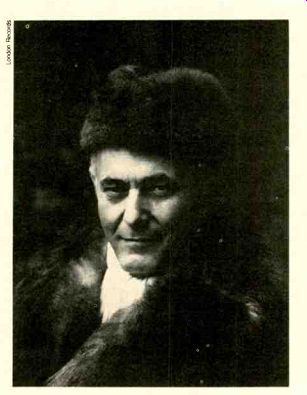
---Sir Georg Solti's Eugene Onegin for London Invites Comparison with the
Bolshoi Production---
TCHAIKOVSKY'S Eugene Onegin was perhaps the most outstanding among the Bolshoi Theatre's presentations at the Metropolitan Opera during its memorable American tour of 1975, and I can pay no greater compliment to London's new recorded version of this beautiful opera than to say that it is worthy of comparison with the stunning Bolshoi performance I saw under Yuri Simonov's direction, with Tamara Milashkina, Vladimir Atlantov, and Yuri Mazurok in the cast.
On records, the new set must stand comparison with an earlier Bolshoi per formance taped in Paris (Melodiya/Angel SRCL-4115) with the same male protagonists but with Galina Vishnev skaya in the role of Tatiana. I am not qualified to judge the London cast's Russian diction, and it is possible that it falls short of that of the Bolshoi's singers by a considerable margin. (It should be pointed out, however, that Teresa Kubiak and Julia Hamari are East European singers and Nicolai Ghiaurov is actually Russian-trained.) To my ears, the new London recording does cap ture the opera's melancholy mood, as well as its dramatic contrasts between the settings of idyllic countryside and metropolitan artificiality, with admirable faithfulness.
Drawing exquisite music-making from his chorus and orchestra, conductor Sir Georg Solti reveals all the beau ties of Tehaikovsky's writing. I find his livelier pacing generally more effective than the somewhat indulgently unhurried tempos of Mstislav Rostropovich in the Melodiya set even as I feel that, though he doesn't actually rush things, he might have savored just a few felicitous moments as lovingly as Rostropovich does.
Both recorded Tatianas display a full understanding of the character. Neither is the steadiest of singers, but Miss Kubiak is decidedly more secure in the top register, and, furthermore, she sup plies the more convincing girlish timbre. It is not easy to choose between the two tenors, either. Atlantov is the more impulsive and more exciting (though when I heard him in person, five years after the Melodiya recording, he was even better), London's Stuart Burrows the more refined in his vocal ism. Perhaps the warm-toned, well-modulated lyric tenor of Burrows comes closer to the elusive ideal of "an eighteen-year-old youth with curls, the impetuous and singular manner of a young poet a la Schiller" envisioned by his creator Pushkin and musically characterized by Tchaikovsky.
Bernd Weikl, who sounds very much like Hermann Prey, is a very fine baritone, but at times he sings Onegin's music a bit too aggressively and with out that pervading aura of world-weari ness that is essential to the character.
He may make an interesting Onegin on stage, but on records I prefer the admirable Yuri Mazurok. London's Ghiaurov, however, is more impressive than his Bolshoi counterpart in Prince Gre min's one-aria role. Except for the Captain, the secondary roles are very well done, and Solti gets excellent results from his singers in the various important vocal ensembles.
London's technical production could hardly be bettered. Full libretto and good notes accompany the set, but the illustrations are poorly reproduced.
George Jellinek
TCHAIKOVSKY: Eugene Onegin. Anna Reynolds (contralto), Madame Larina; Teresa Kubiak (soprano), Tatiana; Julia Ha mad (mezzo-soprano), Olga; Enid Hartle (contralto), Nurse; Bernd Weikl (baritone), Eugene Onegin; Stuart Burrows (tenor), Lenski; Nicolai Ghiaurov (bass), Prince Gremin; William Mason (bass), Captain; Richard Van Allan (bass), Zaretsky; Michel Senechal (tenor), Monsieur Triquet. John Alldis Choir; Orchestra of the Royal Opera House, Covent Garden, Sir Georg Solti cond. LONDON OSA 13112 three discs $20.94.
Thamos, King of Egypt: A Mozart Rarity Prefiguring The Magic Flute
Mozart, whose judgment in such matters seldom erred, was especially pleased with the music he wrote in the 1770's for the Baron Tobias Philipp von Gebler's play Thamos, King of Egypt. Alfred Einstein considered the sequence of choruses and entr'actes for Thamos to be a "springboard" for The Magic Flute.
The entr'actes from Thamos are heard rarely enough today (there is an excellent recording of them by the London Symphony Orchestra under Peter Maag on London STS-15088), and the choruses Einstein praised so highly are virtually never performed (they do not appear to have been avail able on records since Rolf Reinhardt's Vox disc, PL 7350, was retired some twenty years ago). However, Philips now has come forth with a superb new recording of the entire Thamos sequence, plus the Symphony No. 26 in E-flat (K. 184) which Mozart suggested...
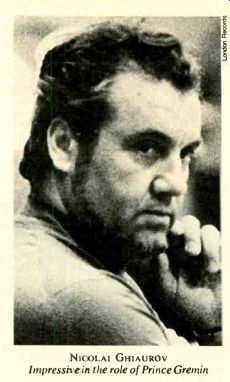
---------74 NICOLAI GHIAUROV Impressive in the role of Prince Gremin
... for use as an overture, the whole taped in East Berlin under the direction of Bernhard Klee. It is a stunning illustration of the principle that a whole may be greater than the sum of its parts, for the entr'actes and choruses together add up to a greater, more forceful entity than might be suggested by any separate presentation of the work's respective segments.
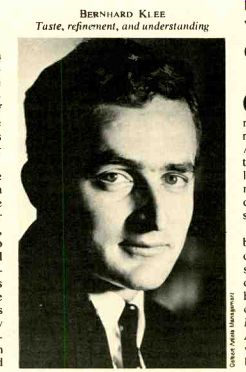
---------- BERNHARD KLEE Taste, refinement, and understanding
Anyone familiar with Klee's Deutsche Grammophon recording of Beethoven's Christus am Olberge (2530 228) or his sensitive piano accompaniments in the Mozart song recital by his wife, Edith Mathis (DG 2530 319), will approach this Thamos with the highest expectations-and risks no disappointment. Taste, refinement, and under standing characterize this splendidly proportioned presentation, which is in formed with the sort of animation one expects to encounter only in a live concert-and none too frequently there, at that. Theo Adam brings credible majesty to his Sarastro-like part in the final chorus, the lesser-known soloists in the two earlier ones show themselves fully qualified for such a partnership, the choral and orchestral work are absolutely first-rate through out, and the sound, too, is excellent.
This recording amounts to a real discovery even for Mozartians, a rewarding challenge for other listeners, and a happy event on all musical counts.
Richard Freed
MOZART: Symphony No. 26, in E-flat Major (K. 184); Incidental Musk to "Thamos, King of Egypt" (K. 34s). Karin Eickstaedt (soprano); Gisela Pohl (contralto); Eberhard Buchner (tenor); Theo Adam (bass); Berlin Radio Chorus; Berlin State Orchestra, Bern hard Klee cond. PHILIPS 6500 840 $7.98.
Until You Get It From Tina Turner, You Just Haven't Gotten the Message
ONE of our finest, feathered, and friendly canaries, Ms. Tina Tur ner, is back again and up, evidently, to no good. Her new release for United Artists is called "Acid Queen" (thanks to her playing that role in Ken Russell's looney-tunes film version of "Tommy," of course), and it is enough to set off an early January thaw anywhere south of Point Barrow.
We older fellas know that Tina's been shakin' it around (and up and down) for quite a few years now, but she's still a long way from being yesterday's rose (if you think so, then you tell her). Proof here is the way she straddles Mick Jagger's Let's Spend the Night Together or proclaims herself the Acid Queen. Listen to either and you will know that she is going to be in the business as long and as profitably as a Mae West or a Marlene Dietrich. Tina is ... well, a bit more candid than either of these ladies could afford to be in their heyday, but she's delivering the same message, and until you get it from Tina, you just haven't gotten it.
To be as serious about it all as one can--or ought--to get, what Tina Turner has most of is humor, humor about herself and about any audience unsophisticated enough to take her as any thing other than what she is: simply a marvelous show-woman of the classic breed. Listen to her rampage her way through Pick Me Tonight and you just know she's putting the congregation on for all its pious, goggle-eyed worth.
Another Jagger song, Under My Thumb, gives her all the working room she needs to display her femme fatale side-you know, the one that performs orchidectomies with the flick of a quip.
The album, as is usual, has been...
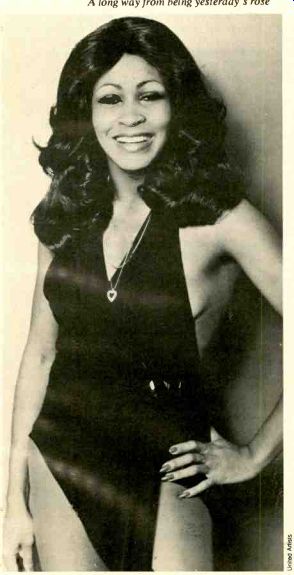
---- TINA TURNER: A long way from being yesterday's rose.
...fitted closer to her abundant talents than panty hose. The seamless production work is by Denny Diante and Spencer Proffer, and the arrangements (by Diante, Proffer, Jeffrey Marmelzat, and Jimmie Haskell) surround her like musk. Ike (you remember him, don't you?) turns up as "Executive Producer" and also as a performer in Baby Get It On. But it's Tina's show all the way, and she's still giving you much more than your money's worth.
-Peter Reilly
TINA TURNER: Acid Queen. Tina Turner (vocals); orchestra. Under My Thumb; Let's Spend the Night Together; Acid Queen; I Can See for Miles; Whole Lotta Love; Baby-Get It On; Bootsey Whitelaw; Pick Me Tonight; Rockin' and Rollin'. UNITED ARTISTS UA-LA495-G $6.98, C) EA495-H $7.98, C) CA495-H $7.98.
---
Jerry Jeff Walker: Getting Around the Sweet Talk Without Losing the Sentiment
JERRY JEFF WALKER is good at, among other things, quoting other people. On one album jacket he recalled a friend's saying, "Indecision may or may not be your problem." On the jacket of "Ridin' High," his new one for MCA, he quotes another friend:
"Anything that's not a mystery is just guesswork." In the grooves of that al bum he quotes friends-friendly song writers, including Bob Livingston, Guy (Old Time Feelin') Clark, Mike Burton, Willie Nelson, and Jesse Winchester at some length, choosing to include only two of his own songs in it. This kind of thing is often disastrous when one more famous for his writing than his singing does it, but Walker's hung over but undefeated singing voice and his good ear for what others are saying (and playing) turn out to be a hard combination to beat. He even manages to speak on the jacket about being (hold onto your bottles, buckaroos) married and to sing what he calls a wedding song-hell, he even manages to do one of his own called I Love You, a grotesque title for a Jerry Jeff Walker song-and still the thing refuses to sink.
That may be because Walker, like most rowdies, is actually quite a sentimental fellow and knows how to handle being one, how to avoid the sweet
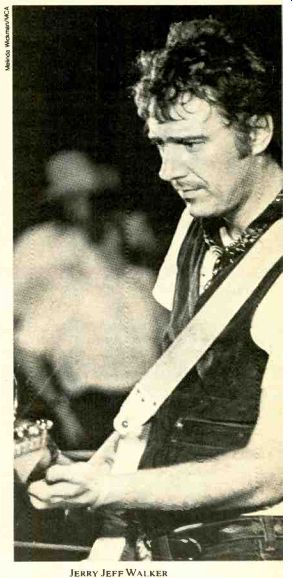
-- JERRY JEFF WALKER
A hangover but undefeated singing voice words in describing a sweet sentiment, whether in his own writing or in some one else's. He also knows how to leave his musicians alone-he likes to let them have at it and then live-mix the results-and that accounts for how full of ginger the sound of this one is. It doesn't top "Viva Terlingua"; topping that one is still proving to be quite a job. But it is loose and full of snap, and it's gratifying to hear what a famous songwriter can do when he puts down his pen and listens to what his friends are saying. -Noel Coppage
JERRY JEFF WALKER: Ridin' High. Jerry Jeff Walker (vocals, guitar); Lost Gonzo Band (instrumentals); other musicians. Pub lic Domain; Like a Coat from the Cold; Night Rider's Lament; Pick Up the Tempo; I Love You; Goodbye Easy Street; Mississip pi You're on My Mind; Jaded Lover; Pot Can't Call the Kettle Black; Pissin' in the Wind. MCA MCA-2156 $6.98.
============
Also see:
Source: Stereo Review (USA magazine)